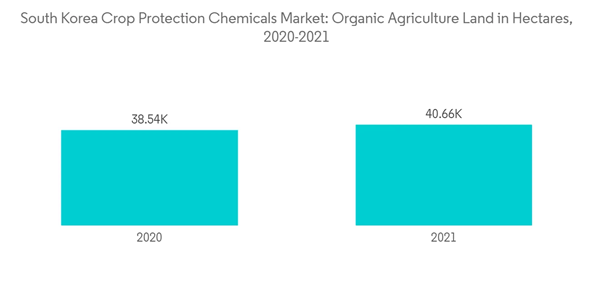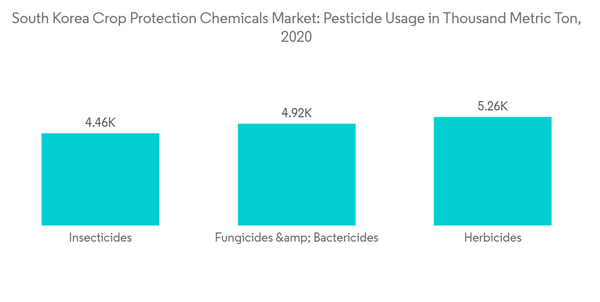Key Highlights
- In South Korea, rice is the most cultivated grain, which accounts for about 90% of the total grain production and over 40% of farm income. In addition, other crops include vegetables, soybean, other oilseeds, and fruits and vegetables that consume the bulk of crop protection chemicals. South Korea is a mountainous country, with less than 22% of the land area available as arable land. Hence, Korean farmers emphasize maximizing productivity per unit of land, and efficient crop protection solutions play an essential role in achieving efficient productivity.
- Major players are innovating with new products based on safety and regulatory issue in the market and eco-friendly products. For instance, Adama expanded its proprietary nematicide, Nimitz, to Japan, the world's fourth-largest agricultural market, and also to South Korea and Taiwan. Adama has secured regulatory approval for the product in these markets for various crops, among them sweet potatoes, fruiting vegetables, melons, and others, in addition to the existing product registrations in several other markets, such as the US, Mexico, Australia, and Israel. It offers a highly effective and simple-to-use solution to farmers for the control of nematodes, along with a low toxicity and eco-toxicity profile compared to other alternatives currently on the market.
- Korean agricultural authorities introduced the Positive List System (PLS), accelerating the rapid growth of biological and eco-friendly products in Korea. This new regulation, which aims to promote pesticide residue safety, stipulates that farmers should strictly follow product labels and guides in terms of application on crops, application frequencies, application rate, and other important safety precautions. As a result, in many sectors, farmers couldn't use chemical pesticides that were used conventionally for a long time without a label list. In addition, these chemical pesticides were replaced by bio-pesticides. This will boost the market to grow in the coming years.
South Korea Crop Protection Chemicals Market Trends
Increasing Use of Microbial Pesticide
- After the pandemic, a significant proportion of the population-461,000 in 2019 to 495,000 in 2020, or 7.4% more than the previous year-moved into farming. As a result of the growing emphasis on environmental sustainability, the South Korean government implemented Environment-Friendly Agriculture (EFA) policies that aim to promote pesticide residue safety and the use of only registered brands of agrochemicals.
- In addition, severe punishment will be implemented if there is any violation of these regulations. The growth of biological products and the reduction in the use of synthetic chemicals are both fueled by these regulations.
- Insects like thrips and mites are resistant to chemical insecticides. Therefore the only option to manage them is by using bio-insecticides. As a result, farmers are turning to bio-pesticides or insecticides. In South Korea, farmers use biopesticides, especially before harvest, to reduce chemical residues.
- The government of South Korea has been actively attempting to help farmers in switching to the former to increase income and meet demand. According to FiBL, in 2021, the organic area in the nation increased from 38,540 hectares the previous year to 40,663 hectares.
- Compared to conventional farming, the South Korean Ministry of Agriculture estimated a reduction of around 18,062 tonnes of chemical fertilizers and roughly 834 tonnes of pesticides. With higher profit margins and escalating demand, many farmers are attempting to switch to organic farming. This will promote and accelerate the market's growth during the forecasted period.
Herbicides are the Largest Segment
- Since 2001, South Korea's use of agricultural pesticides has gradually decreased after increasing from 1970 to 1990. Pesticide usage has been declining. In 2020, 16,278 metric tonnes of pesticides were used, down from 16,745 metric tonnes the year before. This decrease can be attributed to farmers being more aware of bio-pesticides and, in some cases, the pandemic effect on the nation.
- To prevent human diseases and environmental degradation, the Korean government has put into effect a new regulation that aims to promote pesticide residue safety and requires farmers to strictly abide by product labels and instructions regarding the application on crops, application frequencies, application rate, and other crucial safety precautions. This will guarantee and promote the segment's growth during the coming years.
- A total of 88% of transgenic plants grown worldwide are tolerant to one or more herbicides, the vast majority of which are glyphosate. For instance, crops like soybeans, maize, oilseed rape, cotton, and rice are tolerant to herbicides. In South Korea, the herbicides that transgenic plants' tolerate,' such as glyphosate or glufosinate ammonium, are non-specific. As a result, their use has become widespread, and herbicide doses have increased. Thus, herbicide use has increased in the country over the last three years. According to Food and Agriculture Organization (FAO), herbicide use in agriculture increased by 5259 thousand metric tons in 2020, which increased compared to the previous year. These factors are expected to boost the segment in the coming years.
South Korea Crop Protection Chemicals Industry Overview
The South Korean crop protection chemicals market is fairly consolidated, with a few companies holding the majority of the shares in the market, including Syngenta, Bayer Korea Ltd, UPL Ltd, Adama Korea Co. Ltd., and Farm Hannong. In the fast-growing market, companies are competing based on product quality or product promotion and making other strategic moves to acquire greater market share and expand their acquired market size.Additional Benefits:
- The market estimate (ME) sheet in Excel format
- 3 months of analyst support
This product will be delivered within 2 business days.
Table of Contents
Companies Mentioned (Partial List)
A selection of companies mentioned in this report includes, but is not limited to:
- Adama Korea Co. Ltd
- BASF SE
- Bayer Korea Ltd
- Farm Hannong
- KoreaBio Co. Ltd
- Kyung Nong Corporation
- Nisso Korea Co. Ltd
- Nonghyup Chemical
- Sungbo Chemicals Co. Ltd
- Syngenta
- UPL










